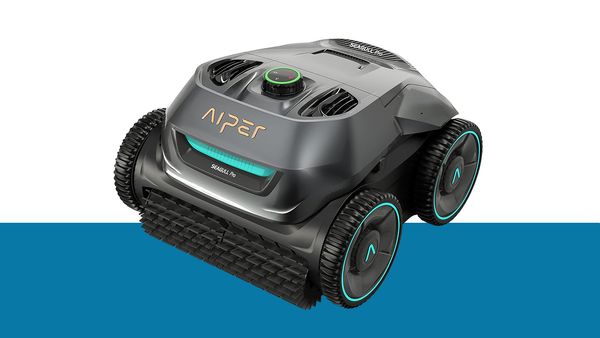Aiper Cordless Robotic Pool Cleaners are on Fire — Literally
With multiple alleged reports of Aiper pool cleaners catching fire, we dive into the details.
January 16th, 2025
January 16th, 2025

Is your cordless robotic pool cleaner a fire hazard waiting to happen? This concern is growing after a terrifying incident in Las Vegas, Nevada, where an Aiper Seagull Pro Cordless Robotic Pool Cleaner allegedly triggered a devastating house fire. Shocking videos show flames engulfing a family's home, destroying their belongings and endangering their pet cat, Pooka, who was thankfully resuscitated by firefighters.
This event has sparked a broader conversation about the safety of cordless pool cleaners powered by lithium-ion batteries. As more homeowners opt for cordless pool robots, it’s vital to understand the risks involved with these batteries, especially when charging.
As we've covered in the past cordless vs corded robotic pool cleaners, we've seen and talked about the risks of cordless pool cleaners since they use lithium ion batteries. With Aiper's previous model, the Aiper Elite Pro, being recalled by the United State Consumer Product Saftey Commission (U.S. CPSC) due to burn and fire risks, this appears it isn't the first time one of their products has had a burn and fire risk.
According to reports, the fire allegedly started shortly after the homeowner plugged in the Aiper Seagull Pro for charging. Security footage shows the homeowner plugging in the device, expecting a normal charge cycle. But moments later the wife noticed that flames erupted, catching everyone off guard. The homeowner rushed to extinguish the fire but struggled to control the growing blaze.
The fire caused significant damage to the house and nearly claimed the life of the family’s pet, Pooka. The cat was heroically revived on the scene by firefighters using oxygen. The financial and emotional toll on the family has been immense, leaving them in shock and eager for answers.
The homeowner believes the Aiper Seagull Pro was responsible for the fire, drawing attention to the potential dangers of lithium-ion batteries in cordless pool cleaners.
The Las Vegas incident isn’t an isolated case. In the past year, several reports have surfaced of cordless robotic pool cleaners allegedly catching fire, often during charging. Another video circulating online shows another Aiper Seagull Pro fully engulfed in flames.
And again in a second video, in what is allegedly the aftermath of a fire from an Aiper Seagull Pro, the video appears to show a burnt Aiper pool cleaner that remains charred beyond recognition.
These incidents raise alarms about the safety of lithium-ion batteries — a common power source for many cordless devices, but particularly risky in environments exposed to water or extreme temperatures.
The main culprit behind these fires seems to be the lithium-ion batteries that power most cordless pool cleaners. While these batteries offer high energy density, but they also come with serious risks. If damaged or exposed to extreme conditions, they can overheat and enter a dangerous state known as thermal runaway. This chain reaction can lead to explosions or fires.
As of now, Aiper has not made any public statements addressing these fire incidents, leaving many consumers frustrated. Aiper, founded in 2017, quickly gained popularity for its affordable pool cleaning robots, but this incident raises questions about the safety and reliability of their products.
The Las Vegas homeowner is reportedly planning to sue Aiper for damages related to the fire and emotional distress, according to his youtube video. With more consumers coming forward with similar complaints, the company may face legal challenges and a tarnished reputation unless they address these safety concerns.
The rise of cordless pool cleaners is largely due to their lower price tag. Cordless pool cleaners rely on lithium-ion batteries, which pose a fire risk, whereas corded pool cleaners eliminate that concern entirely.
Corded robotic pool cleaners not only avoid the dangers of overheating batteries but also deliver superior cleaning power and longer run times. Brands like Dolphin and Polaris offer powerful, reliable corded models that outperform their cordless counterparts in terms of debris removal and suction strength.
When comparing cordless and corded models, corded pool cleaners emerge as the safer and more powerful choice, offering better performance and peace of mind.
If you own a cordless robotic pool cleaner, follow these precautions to reduce the risk of a fire:
It’s important to note that not all robotic pool cleaners are prone to fires. Corded models, especially those from reputable brands like Maytronics, Aquabot, or Pentair, do not face the same battery-related risks as cordless models. Cordless models using lithium-ion batteries are the primary concern due to the potential for overheating.
As the popularity of robotic pool cleaners grows, it’s crucial for consumers to weigh the risks and benefits of cordless versus corded models. While cordless models may be attractive due to their lower price and convenience, the potential dangers of lithium-ion batteries cannot be ignored.
The Aiper Seagull Pro alleged fire in Las Vegas is a stark reminder of the dangers of lithium-ion batteries in cordless pool cleaners. As more consumers adopt these devices, manufacturers must prioritize safety testing to prevent further incidents.
For now, if you own a cordless robotic pool cleaner, follow all safety precautions. When in doubt, consider switching to a corded model for superior performance and safety.
This article is intended to provide information based on publicly available data and does not constitute legal or professional advice.
All incidents described are based on consumer reports, and no fault or liability has been legally determined as of the date of publication.